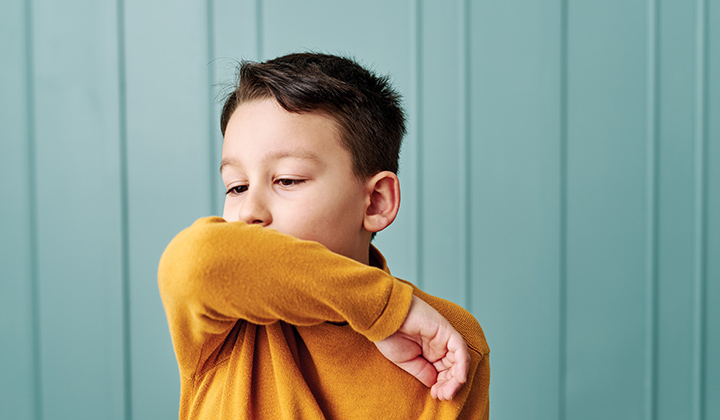Get updates
Have a parenting hack to share? Or a topic you'd like to see?
Coughs: What parents need to know

As the weather gets colder, the calls start coming: “My child can’t stop coughing. What do I do?”
As a pediatrician, I understand how alarming persistent coughs can be for parents. Although many coughs are harmless and resolve on their own, some do require medical attention. Let's go through the common causes of long-lasting coughs, when to get professional care and how to ease symptoms at home.
What causes coughing?
Coughing is a protective reflex that helps clear mucus or irritants from the respiratory system. The majority of childhood coughs are caused by infections, although some other conditions can play a role. Here are the most frequent culprits:
- Upper respiratory infections, like the common cold, inflame the respiratory tract and trigger mucus production and coughing — along with congestion, runny noses, low-grade fever and fatigue.
- Bronchiolitis is caused by viral infections, including RSV, and is most common in infants and young children. It affects the small airways in the lungs and leads to a wet or “productive” cough (your child coughs up mucus). Most of the time, bronchiolitis is mild, but severe cases can require hospitalization.
- Croup inflames and constricts the tissue around the vocal cords, causing a cough that sounds like a barking seal and can get worse at night. In many cases, parents can manage croup at home, but depending on how your child is doing, they may need to be evaluated by a physician.
- Asthma can cause coughing accompanied by wheezing or shortness of breath. If your child has asthma, make sure your action plan is up-to-date, and their prescribed medications are on-hand. Try to avoid their asthma triggers, especially during respiratory-infection season.
- Post-nasal drip, when mucus drains down the back of the throat because of a cold or allergies, can cause a persistent, dry cough, especially at night. That tickle in the throat can be annoying, but it’s usually not serious.
- Pertussis, or whooping cough, still occurs, especially in kids who aren’t vaccinated. Pertussis causes violent coughing spells that end in a “whooping” noise. It needs medical attention right away.
When does a cough require medical care?
Most coughs will improve with time and supportive care at home (see below). After a viral infection, you can expect your child’s cough to last up to a couple weeks.
Unfortunately, the body is more like a parking lot than a single parking space: We can have multiple viruses at the same time. The clock on your child’s symptom duration resets every time your child gets a new virus, which means it can feel like your child has been coughing all season long.
If you notice any of these red flags, it’s important to see your pediatrician (or visit an urgent care or emergency room if outside of clinic hours):
- Difficulty breathing demands immediate medical attention. You can tell your child is working too hard to breathe if their nostrils are flaring, they are making a grunting noise, or they are over-using their chest muscles or belly to breathe.
- Wheezing or a whistling sound when breathing should be evaluated, especially if your child hasn’t been diagnosed with asthma before.
- Fever lasting more than 3 to 4 days may indicate a bacterial infection requiring treatment. While some viruses have their peak around days 3 to 5 of symptoms, you should consider a visit to your pediatrician to ensure something else is not going on.
- A cough that lasts more than 3 weeks can be a sign of asthma, pertussis or even pneumonia. All 3 need medical care.
- Discolored lips or skin could be a sign of lack of oxygen, which can turn the skin around the mouth or even the entire face purple, blue or gray depending on your child’s skin tone. If you notice these changes in color, get emergency care.
- Vomiting after coughing can lead to dehydration if your child is unable to take and hold down liquids. Your child should be evaluated promptly if this occurs.
- Chest pain with coughing could be a sign of pneumonia, costochondritis (inflammation of the chest wall cartilage), or pleurisy (inflammation of the tissue around the lungs) and should also be checked out by a doctor.
How can families treat coughing at home?
Children under 6 years old should not be given over-the-counter cough medicines because of potential side effects and limited impact. Instead, you can ease your child’s coughing with some simple, effective home remedies:
- Use a cool mist humidifier, which is particularly helpful for viral bronchiolitis and croup.
- Hydrate to help thin mucus and make it easier to clear from the lungs.
- Honey (for children older than 1) is a natural cough suppressant. It can reduce irritation and coat the throat. Honey given to children under the age of 1 can have an increased risk for infant botulism; only give honey to children after their first birthday.
- Saline nasal drops and gentle suctioning can help bring relief to younger children who haven’t learned to blow their nose yet.
With these home treatments (and patience!) your child’s cough should get better with time. Watch for red flags and don’t wait to call your pediatrician or get urgent/emergency care if things get worse.
Find a Children’s Mercy Urgent Care location near you.
Find a Children’s Mercy Emergency Department near you.

